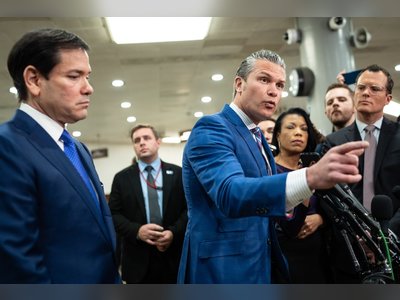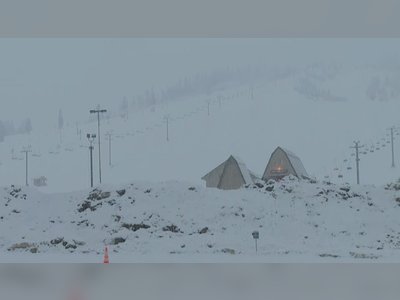
Humanitarian Groups Brace for New Challenges on U.S.-Mexico Border
Aid workers at the U.S.-Mexico border prepare for increased scrutiny under potential political shifts.
On a windswept day in the Sonoran Desert, a group of humanitarian volunteers carried out their mission, leaving vital resources like water and food for migrants in isolated parts of the Organ Pipe Cactus National Monument, just 32 kilometers north of the U.S.-Mexico border.
This act of humanitarianism is fraught with danger, not just from the treacherous terrain and climate, but also due to heightened political tensions.
In recent years, the area has become one of the most lethal migration corridors globally, exacerbated by climate change and stringent border policies.
Humanitarian workers, undeterred by severe environmental challenges, face increasing threats as political discourse heats up with discussions about more stringent border enforcement under a potential new Trump administration.
Volunteers, aware of past legal actions against humanitarians like Dr. Scott Warren for providing aid, expressed concerns about intensified criminalization and surveillance.
Organizations such as 'No More Deaths' warn of the risk of escalated activity from both border patrol and armed militia groups, potentially leading to increased vigilantism.
The presence of civilian patrols has reportedly risen in areas such as Sasabe, Arizona, where militia groups have allegedly engaged in harassment activities.
Under the Biden administration, immigration policies were slightly adjusted through programs like CBP One.
However, uncertainties loom as discussions of policy reversals could obstruct these pathways.
Migrants, often with no legal avenue for asylum, continue to rely on dangerous routes marked by treacherous conditions, worsened by a severe climate and physical barriers such as the border wall.
The wall, running through areas like Organ Pipe National Park, features 30-foot-tall steel slats, presenting a harsh obstacle that smugglers persistently circumvent.
Despite its construction causing environmental and social disruptions, breaches by smugglers using tools available on the commercial market are frequent.
Volunteers like Tom Wingo from Humane Borders, actively conduct patrols in remote areas, looking for signs of migrant activity, to provide necessities such as water, a critical resource in the arid environment.
The stark conditions are compounded by natural water sources running dry, leaving migrants reliant on humanitarian efforts.
Statistics from Humane Borders and the Pima County medical examiner’s office reveal that more than 4,329 sets of human remains have been discovered in the desert since 1981, with around a quarter found in the last few years alone.
These figures underscore the perilous nature of the routes taken by migrants.
As the political climate evolves, humanitarian groups face a pivotal moment, doubling efforts to prepare for shifting policy environments while emphasizing the overarching goal of preserving human life amidst tumultuous conditions.
This act of humanitarianism is fraught with danger, not just from the treacherous terrain and climate, but also due to heightened political tensions.
In recent years, the area has become one of the most lethal migration corridors globally, exacerbated by climate change and stringent border policies.
Humanitarian workers, undeterred by severe environmental challenges, face increasing threats as political discourse heats up with discussions about more stringent border enforcement under a potential new Trump administration.
Volunteers, aware of past legal actions against humanitarians like Dr. Scott Warren for providing aid, expressed concerns about intensified criminalization and surveillance.
Organizations such as 'No More Deaths' warn of the risk of escalated activity from both border patrol and armed militia groups, potentially leading to increased vigilantism.
The presence of civilian patrols has reportedly risen in areas such as Sasabe, Arizona, where militia groups have allegedly engaged in harassment activities.
Under the Biden administration, immigration policies were slightly adjusted through programs like CBP One.
However, uncertainties loom as discussions of policy reversals could obstruct these pathways.
Migrants, often with no legal avenue for asylum, continue to rely on dangerous routes marked by treacherous conditions, worsened by a severe climate and physical barriers such as the border wall.
The wall, running through areas like Organ Pipe National Park, features 30-foot-tall steel slats, presenting a harsh obstacle that smugglers persistently circumvent.
Despite its construction causing environmental and social disruptions, breaches by smugglers using tools available on the commercial market are frequent.
Volunteers like Tom Wingo from Humane Borders, actively conduct patrols in remote areas, looking for signs of migrant activity, to provide necessities such as water, a critical resource in the arid environment.
The stark conditions are compounded by natural water sources running dry, leaving migrants reliant on humanitarian efforts.
Statistics from Humane Borders and the Pima County medical examiner’s office reveal that more than 4,329 sets of human remains have been discovered in the desert since 1981, with around a quarter found in the last few years alone.
These figures underscore the perilous nature of the routes taken by migrants.
As the political climate evolves, humanitarian groups face a pivotal moment, doubling efforts to prepare for shifting policy environments while emphasizing the overarching goal of preserving human life amidst tumultuous conditions.












